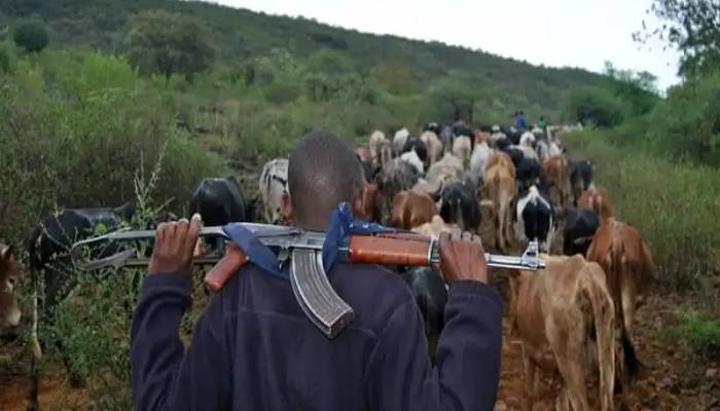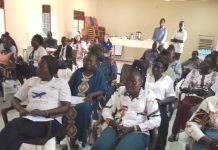Africa-Press – South-Sudan. Tension remained high in Nimule Town, Eastern Equatoria State, until Tuesday morning due to conflict between warring communities. This, has forced some residents to seek refuge in Uganda as others flee to nearby villages.
The on-off fights have resulted in bloody violence with parties trading accusations; some justifying the conflict as innocent civilians suffer, making a mock of the 2021 peace agreement.
on January 27, 2021, a group of 250 community representatives from Jonglei State and Pibor Administrative Area signed a peace agreement after a people to people conference at Freedom Hall in Juba. Here, President Salva Kiir warned various groups to desist from engaging in any form of violence.
A fuming President Kiir told the delegates – comprising the youth, women and elders from, Bor Dinka, Gawaar and Lou Nuer, Murle and Anhuak – that the government would not intervene again if they engage in further violence.
“Next time you go fighting, I will not come to help you again. I will not appoint any committee to go and investigate the fight in the area. I have decided that any fight that takes place will not be stopped by the police or the military. I will leave you to fight,’’ said an angry President Kiir.
Two year later, violence broke out again, this time, in total disregard to President’s Kiir’s warning.
And even though he had dared not send his forces, early this week, a high-level security delegation was dispatched to Nimule to calm tension in the area.
Cattle-herders conflict
The conflict between the warring parties which began nearly a decade back prompted President Kiir to issue an order for cattle owners to move their animals out of Equatoria in 2015. This was followed by several other local orders and agreements that have met some obstacles as herders, mainly from greater Jonglei State, used flooding and insecurity at home as hindrances to return to their place of origin.
However, the farmers-herders conflict started being violent between 2019 and 2021 and reached its peak in February 2022, when violence erupted in Magwi Country, claiming lives and displacing thousands of people.
There have been unsuccessful attempts by the community and church leaders, government representatives as well as lawmakers to peacefully resolve the conflict.
This created feuds and resulted in the trading of accusations with farmers accusing the cattle herders of driving cattle via gardens and destroying their crops while the herders denied saying the farmers attacked their cattle camps, killing and looting animals.
On Wednesday last week, at least 20 people were reportedly killed and more than 1,000 heads of Cattle were raided in Melijo and Mugali Payams of Magwi County, prompting leaders to intervene in the protracted conflict spanning more than two years.
The cattle keepers accused armed Eastern Equatoria youth of crying out the attacks. The accusations, the youth denied.
“People are scared because of the security situation. There are a lot of rumours because this situation started when some groups of people came here and raided the cattle of a certain group who lives in Nimule here from a place called Mugali,”
“So, some tribes staying here want to revenge claiming that some tribes here in Nimule took part in the raid and now people are leaving Nimule because some owners of the raided called are staying in Nimule town and they want to take revenge,” a Nimule resident who identified himself by one name, Kenyi told Radio Tamazuj on Tuesday.
Though the Governor of Eastern Equatoria State, Louis Lobong Lojore condemned the incident, he described what happened in the state as ‘exported’, something that never existed in the region.
On February 19, 2022, Lobong visited Magwi County, where there had been an influx of cattle that sparked security concerns in the areas of Opari, Pageri, and Agoro following concerns about human rights violations allegedly by the herders.
In the same month the Minister of Information and Government Spokesperson, Michael Makuei blamed the cattle keepers for failing to implement orders aimed to bring peace in the Equatoria region.
“We are responsible for the confusion that is happening in cattle camps here. When we say that you should evacuate your cattle, people say okay. In the evening, the same people go and give different information to herders. I don’t want cattle around here,” Makuei said.
According to Makuei the herders were being misled not to return their animals to their place of origins.
“I say that you should vacate these cattle camps and evacuate your cattle early because if the army comes to remove the cattle for you, we don’t need to hear complaints because the army might be taking some cattle and [will] eat some for their survival as they do the work of evacuation for you,” he warned.
However, the cattle herders argued that the constitution provides for South Sudanese to reside in any part of the country hence, the situation forced them to flee to search for pastors and waters for the animals.
But the Equatoria said they were not dividing the people of South Sudan but they want the cattle herders to go because they have become intolerable to the population as far as peaceful co-existence was concerned.
The way forward
On Tuesday government sent security forces to quell the situation in Nimule. The two warring parties agreed to end the violence as cattle herders were allowed to move freely back to their homes.
While this could seem the end of clashes, the government support including providing security and logistics to herders would make it more concrete.
“They said if they can’t get trucks, the process of taking the animals back might take them up to the end of July. If there are trucks, they can move the cattle within the shortest time possible,” Alejandro Lotok, the press secretary in the office of governor Lobong said.
If the demands of herders to provide trucks to carry the cattle could mean that its failure could pose another threat in the Equatoria region, especially at the moment it would be cultivation seasons.
For More News And Analysis About South-Sudan Follow Africa-Press






